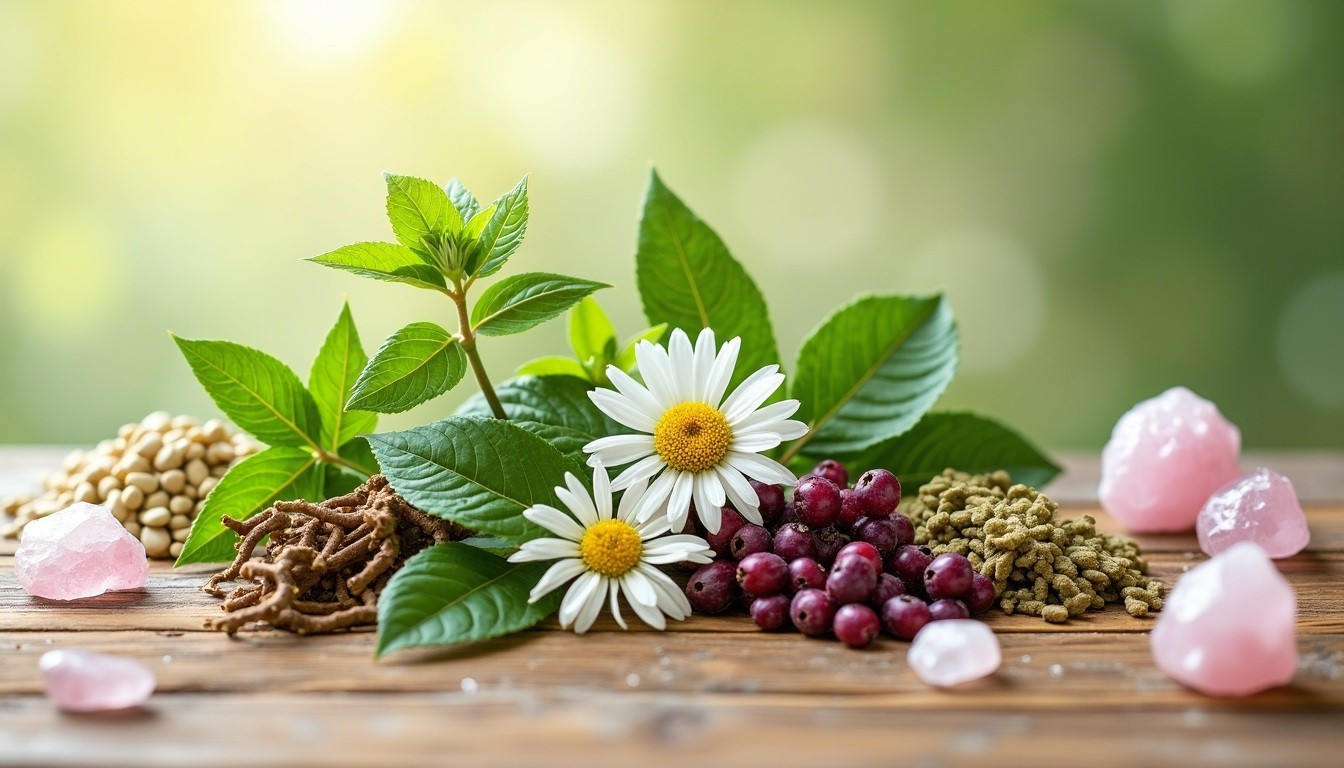

Hormone imbalances affect millions of people worldwide and impact their daily lives. The symptoms range from mood swings and fatigue to serious health complications. Natural alternatives like time-tested hormone balancing herbs are becoming popular, even though conventional treatments are available.
Research shows these natural hormone balancing herbs work well in both traditional medicine and modern studies. Scientific evidence continues to verify how these herbs help people with their hormonal health. Some adaptogenic herbs help manage stress hormones, while others target reproductive health specifically.
This piece looks at seven herbs backed by research that show promising results for hormone balance. We selected each herb based on clinical studies, traditional use, and how well it supports the endocrine system.
Your body’s endocrine system coordinates a network of chemical messengers that control vital functions. These delicate balances can change and cause symptoms. Some changes are subtle while others create major health challenges [1].
Your bloodstream might have too much or too little of specific hormones. These chemical messengers affect several body systems:
Scientists have found more than 50 different hormones in the human body. Each hormone plays a vital role in keeping you healthy [1]. Some imbalances don’t last long, like during pregnancy or puberty. Others become chronic and need ongoing care [1].
Herbs that balance hormones naturally support endocrine function in several ways. Many herbs contain phytochemicals that adjust hormone levels and restore balance [2]. These plant compounds act as adaptogens. They help your body handle stress better while supporting hormone health.
Some herbs target hormone receptors directly. Others support hormone-producing glands or help with hormone metabolism [2]. To cite an instance, some herbs can control cortisol levels, while others focus on reproductive hormone balance [2].
Herbal medicine has transformed over time. Traditional healing systems have used herbs to address hormone problems, especially in women’s health [3]. Modern research is now proving many of these traditional practices right through clinical studies.
Traditional herbal medicine relies on centuries of real-world evidence and comprehensive care. Modern herbal medicine uses standardised extracts and evidence- based methods [3]. This blend of old wisdom and new research has improved our understanding of herbs’ role in hormone balance [2].
New studies reveal that specific herbs work well for certain hormone conditions. Black cohosh and red clover have shown positive effects on menopausal symptoms in clinical studies [2]. Note that herbal supplements don’t face strict regulations like conventional medicines. This makes quality control and proper dosing vital factors to think over [2].
Adaptogenic herbs are natural hormone balancing herbs that help your body handle stress better and support endocrine health. These amazing plants work with your brain’s hypothalamic-pituitary-adrenal (HPA) axis to balance hormones naturally.
Withania somnifera, which most people know as Ashwagandha, stands out from other hormone balancing herbs because it regulates stress hormones well. Studies show that mentally stressed adults who took Ashwagandha had lower serum cortisol levels after 56-60 days [4]. A complete study showed that people taking Ashwagandha supplements had 23% lower morning cortisol levels, while the placebo group’s levels went up by 0.5% [5].
This adaptogenic herb helps you:
Black cohosh (Actaea racemosa) has become a key herb for women’s hormonal health. Research shows it works best with menopausal symptoms [6]. European- approved black cohosh supplements help reduce hot flashes and other menopause symptoms effectively [7].
Research found that postmenopausal women who took black cohosh had a 53% lower risk of certain reproductive health issues compared to non-users [7]. The herb connects with your body’s opioid receptors to balance hormones and reduce pain [8].
Chasteberry (Vitex agnus-castus) helps balance female hormones by working with the pituitary gland. This herb helps balance oestrogen and progesterone by lowering prolactin levels [9].
Women with fertility issues who used chasteberry supplements for three months got great results – 26% became pregnant while only 10% in the placebo group succeeded [9]. The herb also helps with PMS symptoms. One study found that women had fewer mood swings, headaches, and other PMS problems over three menstrual cycles [10].
Ancient medicine systems have always valued specific herbs for their remarkable effects on hormonal health. Modern research now proves it right through detailed scientific studies.
Maca root (Lepidium meyenii), a Peruvian plant used for centuries, shows the most important effects on hormonal balance. Research reveals that maca works through the hypothalamus-pituitary-ovarian axis and helps maintain optimal hormonal equilibrium [11]. Clinical studies show that maca can boost serum luteinizing hormone levels in females, which suggests potential fertility benefits [12].
The root works well for everything in hormonal health:
Research shows that eight weeks of maca supplementation led to measurable increases in estradiol and improved bone density markers [13].
Black seed, or Nigella sativa, shows promising effects on the endocrine system. Research shows it knows how to restore healthy histological architecture of endocrine tissue through its active constituent, thymoquinone [14]. The herb protects hormonal balance well, especially when you have thyroid issues, as studies show it helps regulate TSH levels [15].
Clinical research shows that Nigella sativa supplementation improved hormonal parameters significantly. One study revealed reduced testosterone levels and better menstrual regularity in adolescents [16]. The herb’s rich alkaloid content and healing properties make it effective against hormonal dysfunction [15].
Holy basil (Ocimum sanctum) stands out because research proves its effects on stress hormone regulation. Clinical trials show that eight weeks of holy basil supplementation reduced stress by 37% compared to 19% in the placebo group [17]. The herb excels at balancing cortisol levels, and research shows significant drops in both salivary cortisol and amylase levels [17].
The herb does more than manage stress. Studies show its rich phytochemical content helps decrease cortisol (the stress hormone) [1]. Research reveals that people taking 500mg of holy basil extract daily felt much better about their anxiety and depression symptoms, and became more sociable [1].
Scientists keep confirming how well hormone balancing herbs work through clinical trials and systematic studies. New research gives us a clear picture of how to use these natural remedies safely and effectively.
Clinical studies that break down herbal combinations show great results. A study of the Chinese herbal mixture TG-decoction showed success rates of 66-90% in treating menopausal symptoms [18]. The research team found this combination worked by:
The research shows that mixing specific herbs creates a collaborative effort that works better than using single herbs. These combinations work so well because they target many parts of hormonal health at once [18].
Scientists learned a lot about the right doses and how well our bodies absorb herbal remedies. Studies show standardised extracts give more reliable results than non-standardised ones [19]. The way our bodies absorb herbal compounds changes by a lot based on how they’re extracted and made.
A newer study explains why quality control matters in herbal supplements. Research shows only 42.7% of common alternative medicines meet strict quality standards [20]. This tells us we need to be careful about choosing standardised, well-researched products.
The largest longitudinal study gave us valuable information about using hormone balancing herbs over time. Research shows many herbs are safe, but we still need to take some precautions. A detailed analysis of emergency room visits found about 23,005 cases each year related to dietary supplement side effects [20].
Clinical data shows we need to pay special attention to herb-drug interactions. Studies found potential health risks, with 14.4% affecting blood pressure and 19.8% affecting blood clotting [20]. These findings show why getting professional advice matters if you have existing medications.
Scientists keep learning more about the long-term effects of herbal hormone therapy. Traditional herbs look promising, but researchers say we need better quality control and proper medical supervision [19]. This growing research helps create better guidelines for using natural hormone balancing herbs safely and effectively.
Natural solutions like hormone balancing herbs can help with endocrine health. The safety profile and what it all means need careful evaluation before use. Studies over the last several years emphasise why you should think about risks before starting herbal supplements.
Herbs and conventional medications can interact in ways that raise serious concerns. Studies reveal that herbal supplements might cause dangerous interactions with heart medications, blood pressure medications, blood thinners, and other prescription drugs [21]. St. John’s Wort, which many people use to balance hormones, shows strong interactions with several medications such as:
Research shows these interactions could reduce how well medications work or lead to unexpected side effects [21]. Healthcare practitioners particularly trained in integrative medicine can best guide patients to select safe herbs [21].
Some groups face higher risks from hormone balancing herbs and need close medical oversight. Studies document rare cases where severe liver damage occurred from herbal supplements [22]. Medical supervision becomes vital if you have:
You should ask your healthcare practitioners before starting herbal treatments since herbs can affect surgical outcomes and blood clotting [23].
The biggest problem in the herbal supplement industry remains quality control. Research shows manufacturers don’t need to prove their products work or are safe before selling them [21]. A troubling discovery reveals all but one of these supplements stayed on the market despite safety concerns [21].
Independent testing has found several quality issues:
Budget-friendly solutions include choosing products from companies that use independent testing [21]. The FDA can remove dangerous products, but this process takes years and relies mostly on self-monitoring [21].
Important Safety Guidelines:
Research shows herbal product manufacturers don’t need to prove safety or effectiveness before market release [21]. This lack of oversight means you need to research carefully when choosing hormone balancing herbs.
Natural hormone balancing herbs are promising alternatives to conventional hormone treatments. Scientific research now verifies traditional wisdom. Herbs like Ashwagandha, Black Cohosh, and Chasteberry have proven their worth in addressing specific hormonal concerns.
Getting results with herbal remedies depends on safety and quality control. The best path to desired results comes from standardised, independently tested supplements from trusted manufacturers. You need medical supervision if you have existing health conditions or take medications.
These botanical allies support hormone balance with proper use. Research proves they work in all areas of endocrine health – from stress hormone regulation to reproductive wellness. Knowledge about dosage, possible interactions, and quality helps you use these natural remedies safely and effectively.
Q1. Which herbs are most effective for balancing hormones?
Several herbs have shown promise in supporting hormonal balance. Ashwagandha, Black Cohosh, and Chasteberry are among the most researched and effective options. Ashwagandha helps regulate cortisol levels, Black Cohosh supports reproductive health, and Chasteberry impacts overall hormonal balance, particularly for women.
Q2. How can I naturally improve my hormone balance?
Natural approaches to hormone balance include maintaining a healthy diet rich in protein, engaging in regular exercise, managing stress through techniques like meditation, ensuring quality sleep, and considering herbal supplements under professional guidance. It’s important to address overall lifestyle factors alongside any herbal interventions.
Q3. Are there any beverages that can help balance hormones?
While no single drink can completely balance hormones, certain herbal teas may offer support. Spearmint tea, for instance, has shown potential in regulating hormone levels, particularly for women with conditions like PCOS. However, it’s essential to view beverages as part of a holistic approach to hormonal health.
Q4. What safety considerations should I keep in mind when using hormone-balancing herbs?
When using hormone-balancing herbs, it’s crucial to be aware of potential drug interactions, especially with medications like birth control pills or antidepressants. Quality control is also a significant concern, so choose products from reputable manufacturers that conduct independent testing. Always consult with a healthcare provider before starting any herbal regimen, particularly if you have existing health conditions.
Q5. How long does it typically take to see results from hormone-balancing herbs?
The time frame for experiencing results from hormone-balancing herbs can vary widely depending on the individual and the specific herb. Some studies have shown effects within 8-12 weeks of consistent use. For instance, research on Ashwagandha demonstrated significant cortisol reduction after 56-60 days of treatment. However, it’s important to remember that herbal remedies often work gradually, and results may be subtle at first.






Accepting payments via


YourHealthBasket © 2025
detoxpeople Ltd
Registered in England & Wales 07156741
VAT reg GB 103 3641 60
Our new practitioner portal has been released and it’s now easier than ever to link a client’s account and provide them with suggestions using our new protocol system.
Convert your current cart into a protocol which can then be assigned to a linked client.